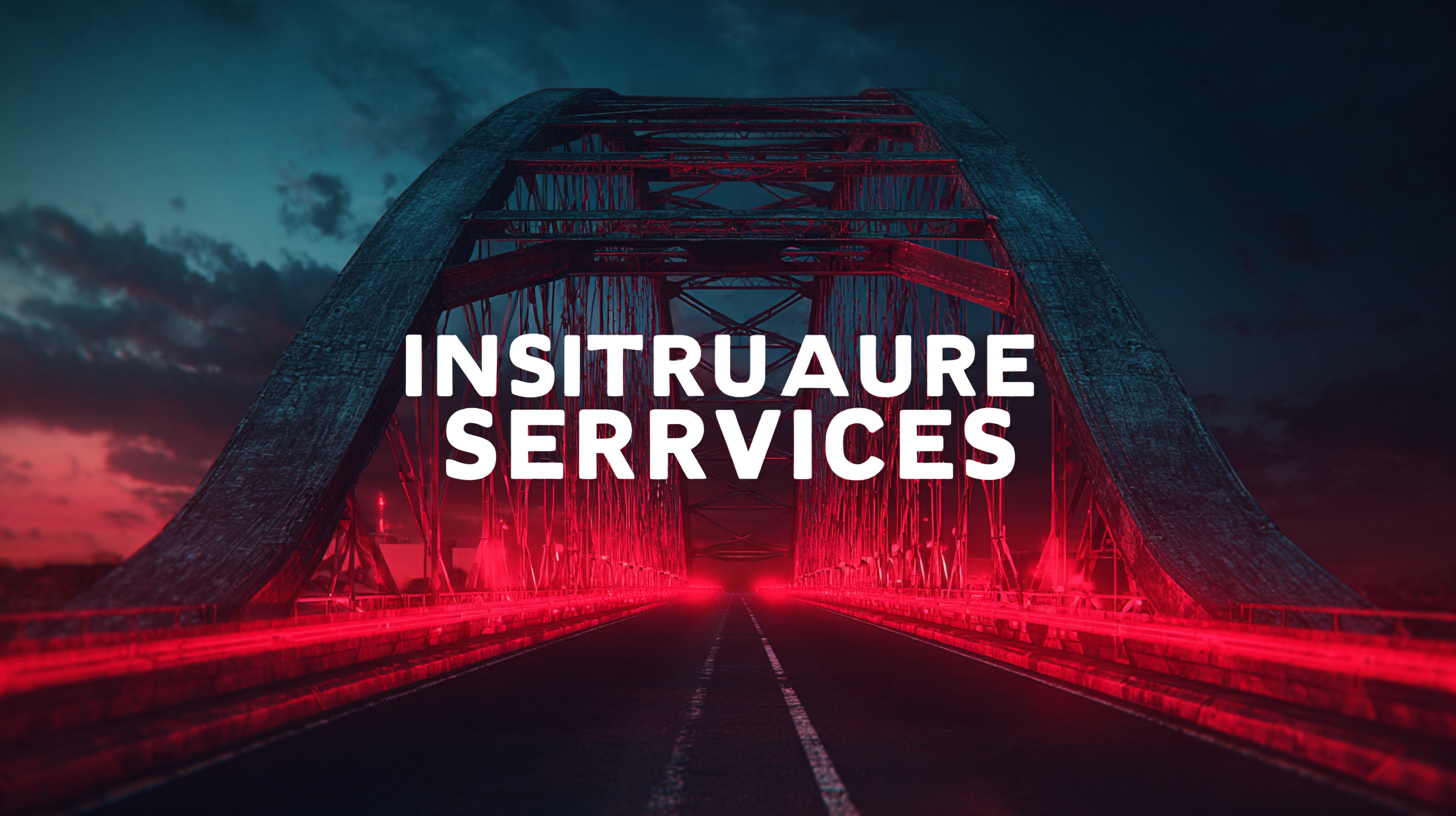Confronting the Challenges of Infrastructure Services: Ensuring Quality and Efficiency in 2023
In the rapidly evolving landscape of 2023, infrastructure services have become a critical pillar for economic growth and societal well-being. As reported by the Global Infrastructure Hub, an estimated $94 trillion is required in global infrastructure investment by 2040 to keep pace with emerging demands and ensure sustainability. With urbanization and population growth driving unprecedented challenges, organizations must confront the pressing need for quality and efficiency in their infrastructure services. The World Economic Forum highlights that enhancing infrastructure performance not only improves public safety but also boosts productivity, facilitating better access to essential services. This blog will explore the myriad benefits of optimizing infrastructure services, delving into strategies that can drive both innovation and resilience in an increasingly complex environment.

Understanding the Current State of Infrastructure Services in 2023
In 2023, the state of infrastructure services is more crucial than ever, facing both challenges and opportunities amid evolving technological landscapes and increasing demand. Organizations must prioritize resilience and equity within their infrastructure frameworks, especially as global events and natural hazards impact service continuity. A recent review highlights that understanding the interplay between infrastructure resilience and equity can lead to better preparedness for unforeseen challenges.
To ensure quality and efficiency, companies should consider targeted investments in their digital and data infrastructures. This means adopting advanced technologies that support efficiency and innovation while addressing the ongoing skills gap in the workforce. By staying informed about technology trends, organizations can strategically align their budgets and resources to maximize their infrastructure capabilities.
Tips for improvement include fostering collaboration across sectors to enhance infrastructure financing, particularly in regions with significant deficits. Participating in research initiatives can provide insights into best practices, while investing in cybersecurity measures is essential to protect critical infrastructure from increasing threats. Organizations that proactively address these aspects will position themselves for greater efficiency and resilience in their infrastructure services.
Identifying Key Challenges Facing Quality and Efficiency in Infrastructure
Infrastructure services are critical for sustaining economic development, yet many sectors face significant challenges that threaten both quality and efficiency. According to the World Economic Forum's Global Competitiveness Report, as of 2022, over 60% of countries reported a decline in infrastructure quality, primarily due to budget constraints and aging assets. Addressing these issues requires a comprehensive understanding of the key challenges, including insufficient funding, outdated technology, and lack of skilled workforce.
To tackle these challenges effectively, stakeholders must embrace innovative solutions. Implementing smart infrastructure technologies can enhance efficiency and reduce maintenance costs. For example, a recent report by Deloitte emphasized that integrating IoT devices in infrastructure management can lead to a 20% reduction in operational expenses. Additionally, investing in workforce training programs can significantly improve service delivery quality.
Tip: Collaborate with technology partners to explore automation and data analytics, which can streamline operations and improve decision-making processes. Moreover, prioritize regular audits and assessments of infrastructure projects to ensure compliance with quality standards. Engaging in public-private partnerships (PPPs) can also provide alternative funding sources and expertise necessary for overcoming existing challenges.
Innovative Technologies Transforming Infrastructure Service Delivery
In 2023, the landscape of infrastructure service delivery is undergoing remarkable transformation, primarily driven by innovative technologies. According to a recent report by McKinsey, the adoption of digital tools in infrastructure management has the potential to enhance efficiency by up to 25%. This surge in digitalization allows for real-time analytics, improving decision-making processes and resource allocation. The integration of smart sensors and IoT technology enables cities to monitor their infrastructure more effectively, reducing downtime and maintenance costs by approximately 30% as noted by a study from the World Economic Forum.
Additionally, artificial intelligence (AI) is playing a pivotal role in revolutionizing how infrastructure services are delivered. A report from PwC highlights that AI can help predict infrastructure failures before they occur, thus ensuring that necessary repairs are conducted proactively. This not only improves the longevity of assets but also enhances service reliability for users. As cities continue to grow, implementing these innovative technologies becomes essential for meeting the increasing demand for quality infrastructure services while also addressing sustainability goals. The adoption of these solutions exemplifies a significant shift towards smarter, more resilient infrastructure systems.

Strategies for Enhancing Quality and Efficiency in Infrastructure Management
Infrastructure management faces numerous challenges in 2023, with the demand for quality and efficiency more pressing than ever. To enhance these crucial aspects, organizations must adopt strategic approaches tailored to their specific needs. Prioritizing regular assessments of infrastructure performance can ensure that services are delivered effectively. This involves using advanced analytics to monitor systems, identify bottlenecks, and deploy timely interventions that maintain service quality.
Tip: Implement a proactive maintenance schedule to prevent service interruptions. Regular checks and updates can save costs in the long run and prolong the lifespan of assets. Additionally, investing in employee training and development is vital. Empowering teams with the necessary skills and knowledge can lead to improved operational efficiency, as staff are better equipped to handle challenges as they arise.
Another effective strategy is leveraging technology to streamline operations. Embracing automation and smart technologies can enhance data collection and processing, resulting in real-time insights that drive informed decision-making. Integrating cutting-edge solutions not only improves efficiency but also fosters innovation in service delivery.
Tip: Explore partnerships with technology providers to access the latest tools and resources. Building these relationships can aid in implementing tailored solutions that address the unique complexities of infrastructure challenges.
Confronting the Challenges of Infrastructure Services: Ensuring Quality and Efficiency in 2023 - Strategies for Enhancing Quality and Efficiency in Infrastructure Management
| Dimension | Current State | Challenges | Strategies for Improvement |
|---|---|---|---|
| Quality Control | Moderate | Inconsistent standards | Implement standardized testing protocols |
| Resource Management | Inefficient | Wastage and misallocation | Adopt advanced analytics for resource allocation |
| Technology Integration | Limited | Lack of interoperability | Invest in integrated management systems |
| Stakeholder Engagement | Low | Poor communication | Enhance communication strategies and feedback loops |
| Sustainability Practices | Emerging | Limited adoption of green technologies | Promote sustainability initiatives and training |
The Role of Policy and Regulation in Shaping Infrastructure Services Future
As we navigate the complexities of infrastructure services in 2023, the importance of policy and regulation cannot be overstated. These frameworks not only guide the development and maintenance of essential services but also ensure that they meet quality standards and operate efficiently. Effective policies can create a conducive environment for private investment and innovation, leading to advancements in technology and service delivery that meet the evolving needs of communities.

Moreover, regulation plays a critical role in holding service providers accountable while protecting consumer interests. By establishing clear guidelines, regulators can promote transparency and fairness within the industry, encouraging competition that drives improvements in service quality. Furthermore, adjusting regulatory frameworks to address emerging challenges—such as climate change, sustainability, and digital transformation—will be essential in shaping the future of infrastructure services. This proactive approach can help ensure that investments in infrastructure not only enhance operational efficiency but also contribute to long-term societal goals.